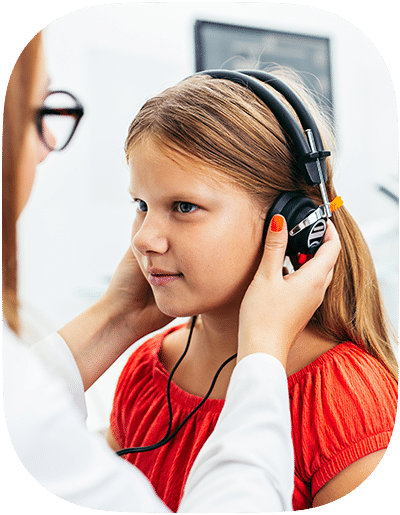Even if you don’t remember it, hearing was an integral part of growing up. Although we tend to think of education as the biggest factor in children’s intellectual growth, they learn communication and language from hearing it around them, as well as absorbing information during social interactions.
When your child’s hearing doesn’t work as well as it should, it can mean greater difficulty learning and getting ahead in life. Unfortunately, many children aren’t tested until they’ve already been hindered in their development, meaning it’s important to get your child tested with a comprehensive hearing assessment using our H.E.A.R. Method™ Treatment Program with the help of a Doctor of Audiology.
What is a Pediatric Hearing Assessment?
A pediatric hearing assessment is simply a testing process that is specifically tailored to children and their unique challenges in hearing development. Hearing assessments for children can require some expertise when it comes to helping them express what they’re experiencing, so our Doctors of Audiology can take the time and proper steps to help your child get accurate results and develop the right plan of action with our proprietary H.E.A.R. Method™ Treatment Program. We’ll spend extra time making sure your child is comfortable and can understand their hearing loss treatment options, as well as what might be causing hearing loss in the first place. In short, we’ll partner with you and your child to make sure your child is set up with everything they need to succeed in the years ahead.
What Happens During a Pediatric Hearing Assessment?
A personalized hearing assessment for children is similar to a hearing assessment for adults, except that we can perform some hearing tests that are specific to children and their development. We’ll start by discussing your and your child’s health history and any genetic or medical factors that might be causing hearing loss. Then, once we have a full understanding of your child’s circumstances, we can perform some hearing tests and compile an audiogram, or graph of your child’s hearing ability created during a pure-tone test.
This helps us assess your child’s treatment options and make the right recommendations. At every step of the way, we’ll make sure your child is relaxed and having fun so we can get accurate results and facilitate a bright future.
Why is a Pediatric Hearing Assessment Important?
Hearing loss is one of the most common birth defects, which is why infants are screened at birth before discharge from the hospital. That being said, children can still experience hearing loss later on for a variety of reasons. These include:
- Congenital factors
- Symptoms of certain diseases, conditions, or injuries
- Ear infections or blockages
Poor hearing ability can take a toll on your child’s education and ability to learn in the classroom or during social interactions. In fact, some children can have their academic development hindered by whole grade levels as a result of hearing loss— and it can become compounded the longer it goes untreated. This means it’s extremely important to have your child tested if you begin to notice signs that they’re experiencing hearing loss. Their future can depend on it!
Schedule an Appointment
During a pediatric hearing assessment at our Livingston office, our Doctors of Audiology can make sure your child feels comfortable and taken care of during a comprehensive hearing test. To learn more or schedule an appointment, we invite you to contact us by calling or filling out our online form.
Frequently Asked Questions
Can fire alarm hurt babies ears?
No. Fire alarms cannot hurt babies ears.
Can hearing loss be reversed in babies?
No, hearing loss cannot is irreversible.
Can a child outgrow hearing loss?
No. If a child has been diagnosed with hearing loss, they cannot outgrow it.
Do babies with hearing loss cry?
Babies with hearing loss cry just like any baby.
Do babies with hearing loss make noises?
Yes! Babies with hearing loss make noise like any other baby.
Do deaf babies make sounds?
Yes. Deaf babies with hearing loss will make cooing and gurgling sounds.
What Are The Signs of Hearing Loss in Children?
It can be difficult to notice if your child has hearing loss when the symptoms can be easily misinterpreted as misbehavior or learning disability. If your child experiences these common signs of pediatric hearing loss, you should have them screened by a Doctor of Audiology as soon as possible: Small vocabulary and delayed speech development, frequently asking for repetition, being unresponsive to having their name called, difficulty articulating certain speech sounds, loud volume on the TV or devices, not acknowledging sounds outside of their field of vision
What Is Visual Reinforcement Audiometry (VRA)?
Visual Reinforcement Audiometry (VRA) is a common hearing test for infants where a sound is played out of their field of vision. If the child doesn’t respond, it can indicate poor hearing ability.
Do pediatricians check hearing?
Most pediatricians routinely perform hearing screenings.
How can I test my babys hearing?
The most accurate way to check your babys hearing is to schedule an appointment with a Pediatric Audiologist.
How can I test my childs hearing?
The most accurate way to check your childs hearing is to schedule an appointment with a Pediatric Audiologist.
How can I test my toddlers hearing?
The most accurate way to test your toddlers hearing is to schedule an appointment with a Pediatric Audiologist.
How do I get my childs hearing tested?
The most accurate way to test your childs hearing is to schedule an appointment with a Pediatric Audiologist.
How many decibels should a child hear?
Normal hearing for children is considered to be anything between -10 and 15 decibels (dB).
What are normal child hearing test results?
Normal hearing for children is considered to be anything between -10 and 15 decibels (dB).
What is normal hearing range for a child?
Normal hearing for children is considered to be anything between -10 and 15 decibels (dB).
How long does a hearing test take for a toddler?
A hearing test for a toddler may take between 30 minutes to 1 hour depending on the toddlers willingness to participate in the activities.

